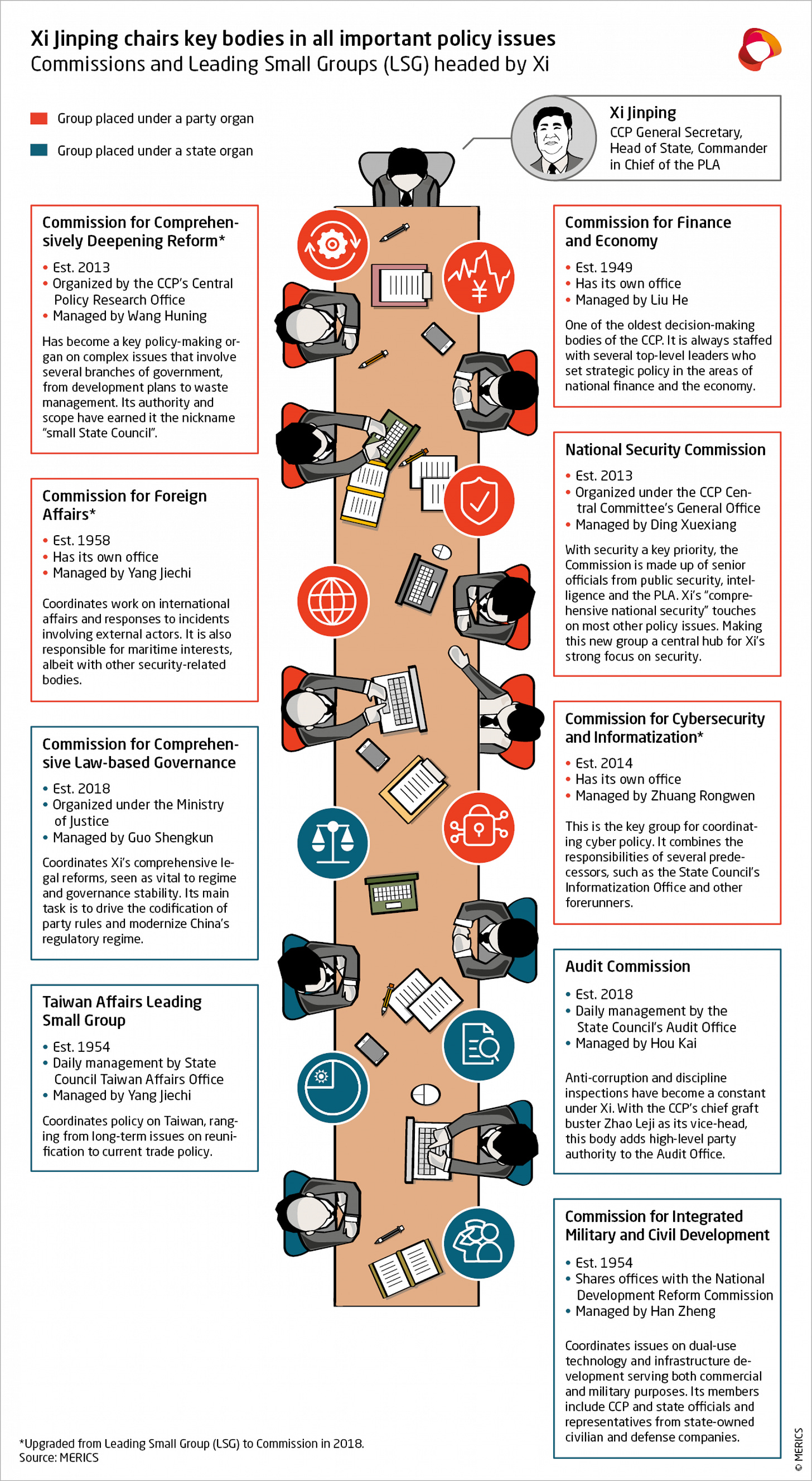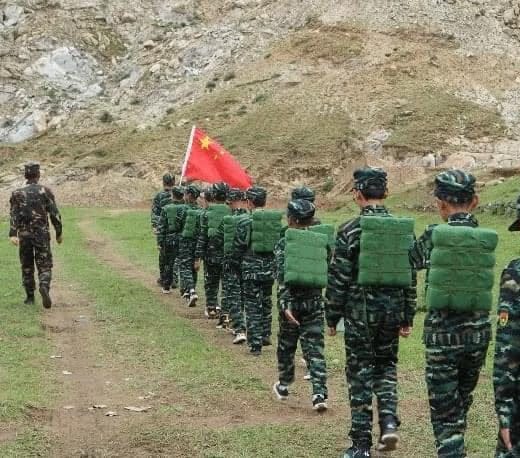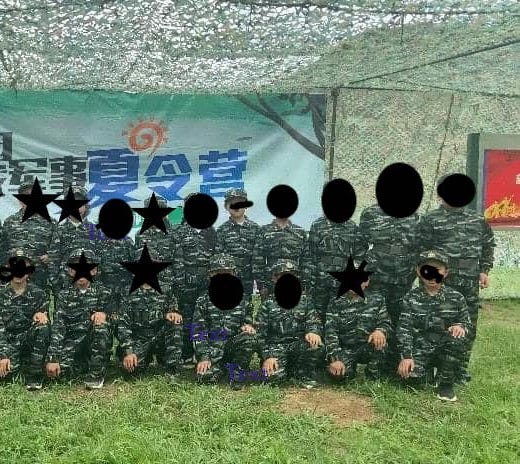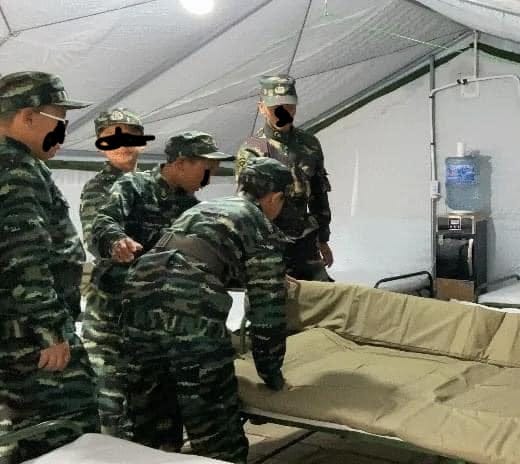Asia Communique
Explaining China's tech crackdown — Olympics and China — India and China create buffer zone at Gogra
What explains China’s tech crackdown?
The common thread among a series of actions taken by Chinese regulators is the targeting of tech companies. The focus on people and tech companies is worth paying attention to.
“Without cybersecurity, there will be no national security, no stable economy, and the interests of the people can hardly be guaranteed,” said Xi Jinping in 2018 at a national conference on cybersecurity in Beijing. The remarks are a vital way to understand how Xi thinks about the role of technology in Chinese society.
Xi Jinping has devoted a great deal of time and energy towards the poverty alleviation campaign. CCTV released a new documentary titled “People's Well-off”, which focuses on the success of the poverty alleviation campaign. I think the answer will emerge from Xi Jinping’s take on China’s next stage of development. Similar to other parts of the world, tech companies have done well during the pandemic. Beijing might be trying to shake the private sector for money and resources.
Even the WSJ that usually has first-hand insight into China’s top decision-makers hasn’t provided a good explanation for what’s going on with the technology crackdown. There is a good reason for that. The newly empowered “leading small groups” within the CCP have the power to take stringent decisions under Xi’s personal leadership, making it hard for journalists to discover behind the scenes decision-making.

The signs suggest that Chinese regulators are just getting started.
“In a private meeting with representatives of global banks and investment firms on July 28, the vice-chairman of the China Securities Regulatory Commission, Fang Xinghai, told attendees that recent crackdowns were meant to fix industry-specific problems and that China has no intention of decoupling from global markets, according to people familiar with the discussions” reported WSJ.
The tech crackdown has now expanded to Tencent.
“Shares of Tencent Holdings Ltd. and rivals fell Tuesday after a state-owned Chinese newspaper criticized online gaming as “opium for the mind,” fueling investor concerns that the companies’ popular games could be swept up into a broader regulatory crackdown”, reported WSJ.
The opium remark cost Tencent $60 billion.
“China's largest social media and video game firm saw its stock tumble more than 10% in early trade, wiping almost $60 billion from its market capitalisation”, reported Reuters.
“In China, the bigger you are, the more you have to follow the government’s rules. There are no companies that are “too big to fail” in China, and nobody should mistakenly believe they can fly in the face of regulations and the government,” wrote Ren Yi in Caixin.
Opinion: The Who, What and Why of China’s Regulatory Campaign — Caixin
“As the annual conclave of Chinese Communist Party heavyweights in Beidaihe draws near, speculation is swirling over President Xi Jinping's plans for top appointments going into his expected third term -- and about whether Xi will even attend the gathering at all.
Every year around August, current and retired party leaders congregate at the seaside resort to discuss policy and high-level appointments, in a tradition dating to the days of Mao Zedong. The meeting is cloaked in secrecy, with no details about the schedule or agenda made public,” said TSUKASA HADANO in Nikkei Asian Review.
The Beidaihe meeting is likely to take place sometime in August. The dates aren’t usually made public, and we only learn about the meeting through other open-source means.
“Chinese tech giant Tencent Holdings censored an article by one of its own staff researchers published on Friday that discussed the country’s widening gap in the digital economy with the US and stressed the importance of the tech sector amid Beijing’s ongoing crackdown on related industries” reported SCMP.
“Chinese telecommunications giant Huawei Technologies reported its biggest-ever revenue drop in the first half of 2021 after U.S. sanctions drove it to sell a chunk of its once-dominant handset business and before new growth areas have fully matured.
The company generated 320.4 billion yuan ($49.56 billion) revenue, it said on Friday,” reported Reuters.
Olympics and China
China’s Olympic team is as competitive as they are every year. But the centre of attraction among the Olympic team is the 14-year-old Quan Hongchan. She is a diver China trained from an early age and came from a humble background.
“China’s divers are programmed from an early age to strive for perfection. The 14-year-old Quan Hongchan delivered it with two of her five dives in a dominant performance to claim the gold medal in women’s 10-meter platform at the Tokyo Olympics on Thursday,” reported AP.
In the interviews following her Olympic win, the journalists asked her various questions about her success, but she couldn’t respond to certain questions. Chinese netizens commented that Quan couldn't respond because she has no education at all. The Chinese Olympic system thrusts divers into an early age training program where they don’t have the time for education.
But that’s not the case for all the Olympians. Others have received an education.
“Many Olympic athletes from the same school caused heated discussions among netizens. Shanghai Jiao Tong University congratulated alumni Wang Shun on Weibo for winning the men's 200-meter medley, alumni Chen Meng won the women's table tennis singles championship, and Sun Yingsha won the silver, alumni” reported Min News.
“How do they have the status of both a student and an athlete” was a topic of discussion on Weibo.
India and China create buffer zone at Gogra
India and China held the 12th round of border talks on 31 July.
“China and India have wrapped up the 12th round of corps commander level meeting, in which the two sides constructively discussed the resolution of remaining areas related to disengagement along the Line of Actual Control (LAC) in the Western Sector of border areas,” the Chinese Defense Ministry said after the talks
India also issued a similar statement. But in a surprise, a statement was issued by the Indian Army saying that both the countries had disengaged at Gogra post (or PP 17A).
“As per the agreement, both sides have ceased forward deployments in this area in a phased, coordinated and verified manner. The disengagement process was carried out over two days i.e. 4 and 5 August. The troops of both sides are now in their respective permanent bases," the army said.
This has essentially created a buffer zone between the two forced deployed at Gogra.
“Sources in the defence and security establishment told ThePrint that as part of the disengagement process, which was first initiated in the area in 2020 but not completed by China, a buffer zone had been created. No patrolling will take place in the area in the foreseeable future, by either India or China, they said,” reported Snehesh Alex Philip for The Print.
“In a significant step towards disengagement, India and China have ceased forward deployments at the key patrol point PP17A, also known as the Gogra Post, in eastern Ladakh”, reported Indian Express.
China hasn’t acknowledged the disengagement. The crisis is far from over.
“Speaking exclusively with India Today, sources in the Indian Army said they were not ready to trust the Chinese People's Liberation Army (PLA) over Friday's disengagement. Thus, the troops stationed along the LAC were supplied with sophisticated equipment like the Sig Sauer assault rifles, MP9 pistol guns and Carl Gustaf rocket launches”
The Paper published a story about Secretary Blinken’s meeting with Tibetan representatives in Delhi and the recent tweet by Modi. The story was originally published by Global Times in China. I ignore Global Times, but they didn’t publish this in English, which means the intended audience was different.
‘India felt guilty as soon as it played the "Tibet card”’
“Speaking of Sikkim, don't Indians blush for their treachery? Despite its faith, India annexed Sikkim in 1975. China has long objected to this and does not recognize this annexation. In China's map, Sikkim was China's neighbour until 2003. In June of that year, India recognized the Tibet Autonomous Region as a part of the territory of the people's Republic of China and reiterated that Tibetans were not allowed to carry out political activities against China in India,” says the article.
“But as India’s experience during 2014-2018 has shown, playing the “Tibet card” does not help India achieve its goals against China,” said the article.
“With former ambassador to the US Cui Tiankai and many other diplomatic veterans retiring in the coming months, observers say that Beijing’s ultimate ambition to outdo Washington in jockeying for influence and primacy in the Indo-Pacific and beyond will also hinge on the transition.
More than the age gaps – 13 years – and seniority in service, what really sets Cui and his successor Qin Gang apart is probably how differently they came of age during the tumultuous Mao era,” reported SCMP.
“On the Sina Weibo account of Xinhua news agency, official accounts of government agencies and state media outlets with more than 100,000 followers, “China Taipei” was used 83.39 per cent of the time when referring to Taiwan’s Olympic athletes and teams, it said, with similar terms used other times” reported Taipei Times.
CCTV Military Reports
Xizang TV had a broadcast that said the traffic of tourists and locals through Ngari Gunsa Airport had surpassed 100,000 people. There were no significant military reports noticed on CCTV.
“Working on the plateau, oxygen is the scariest thing, and the most precious is spirit. Since the Eighteenth Army soldiers followed the party’s orders and marched into Tibet in 1950, generations of officers and soldiers have persisted in the plateau and are willing to make a dedication. They have used their youth and passion for forging people who can bear hardships, fight, endure, unite, and give. "Old Tibetan Spirit,” says a report published by the PLA Daily.
“Meanwhile, the People’s Liberation Army has acquired more mobile ICBMs, which make it harder for an adversary to detect nuclear weapons. They have also mounted more warheads on submarines and ballistic missiles, suitable for both conventional and nuclear munitions, such as the DF-26, a missile that can hit Guam, the US Pacific territory,” reported Financial Times.
“Experts believe that Beijing is moving towards a “launch on warning” posture. Instead of preparing to absorb an adversary’s nuclear first strike before retaliating, China would launch a counterstrike as soon as it became aware that an attack against them was underway,” Financial Times added.
Don’t Miss Out
“US intelligence agencies are digging through a treasure trove of genetic data that could be key to uncovering the origins of the coronavirus -- as soon as they can decipher it.
This giant catalog of information contains genetic blueprints drawn from virus samples studied at the lab in Wuhan, China which some officials believe may have been the source of the Covid-19 outbreak, multiple people familiar with the matter tell CNN” reported CNN.
“A sprawling network of more than 350 fake social media profiles is pushing pro-China narratives and attempting to discredit those seen as opponents of China's government, according to a new study.
The aim is to delegitimise the West and boost China's influence and image overseas, the report by the Centre for Information Resilience (CIR) suggests,” reported BBC.
“The China-built Turgusun hydropower plant has been operating at full capacity since mid-July and will help ease a power shortage in East Kazakhstan Region.
Built by the China International Water and Electric Corporation, a subsidiary of the China Three Gorges Corporation, the station has an installed capacity of 24.9 MW, producing up to 79.8 million kilowatt-hours of electricity per year. The plant is located on the Turgusun River near the city of Altai,” reported Xinhua.
“Meng's defence team claims the Crown used a legal "shortcut" to introduce evidence designed to cover the tracks of prosecutors accused of misleading the court by omitting details that undermine the charges against the Huawei chief financial officer”, reported CBC.
“Chinese education stocks have lost billions of dollars in market value in the past couple of weeks as Beijing announced regulations that could wipe out much of the after-school tutoring sector.
But money is rushing into another populous Asian giant. Indian online-learning platform Unacademy raised $440 million at a $3.44 billion valuation from investors including the SoftBank Vision Fund and Singapore’s state investment fund, Temasek, the company said Monday,” reported WSJ.
“China’s manufacturing sector expanded at its slowest pace in 15 months in July as output growth softened and new orders dipped, a Caixin-sponsored survey showed.
The Caixin China General Manufacturing Purchasing Managers’ Index (PMI), which gives an independent snapshot of the country’s manufacturing sector, slipped to 50.3 from 51.3 the previous month, according to a report released Monday” reported Caixin Global.
Tibet Autonomous Region Regulations on Counter-espionage Security Precautions — China Law Translate
“Lithuania plans to open a representative office in Taiwan by the end of the year, Lithuanian Vice Minister of Foreign Affairs Mantas Adomenas said, reflecting a desire for the two countries to forge closer ties.
A vice minister-level official from the Lithuanian Ministry of Foreign Affairs or Ministry of Economy and Innovation would attend the opening ceremony, Adomenas said in an online interview earlier this week,” reported Taipei Times.
“A longer-range version of Taiwan’s indigenous Tien Chien II (Sky Sword) missile has been tested and would soon enter production, as part of the country’s efforts to counter China, a military source said”, reported Taipei Times.
“The goal is to equip the air force’s Indigenous Defense Fighter jets with the extended-range missiles, which would serve as a more powerful deterrent to China’s frequent incursions into Taiwan’s airspace, the source said on Tuesday, speaking on condition of anonymity” reported Taipei Times.
“Binance Holdings Ltd. will no longer allow users from Hong Kong to open new futures accounts. The largest crypto exchange by reported turnover said in a Twitter post that the move is effective immediately,” reported Bloomberg.
“Tencent Holdings-backed (0700.HK) Chinese education firm VIPKid said on Saturday it would stop selling classes taught by foreign-based tutors to students in China with immediate effect to comply with new rules announced for the country's private education sector”, reported Reuters.
Movers and Shakers
What’s Driving China’s Nuclear Buildup? — TONG ZHAO
China’s Growing Censorship Is Training the Public to Be Online Snitches — Tracy Wen Liu
Is Taiwan Next? — Sarah A. Topol
Is Capitalism Just a Phase? China Struggles With the Math — Bloomberg
Business Street
‘Stealth investment’: Chinese money finds its way into Indian tech as IPOs boom — SCMP








